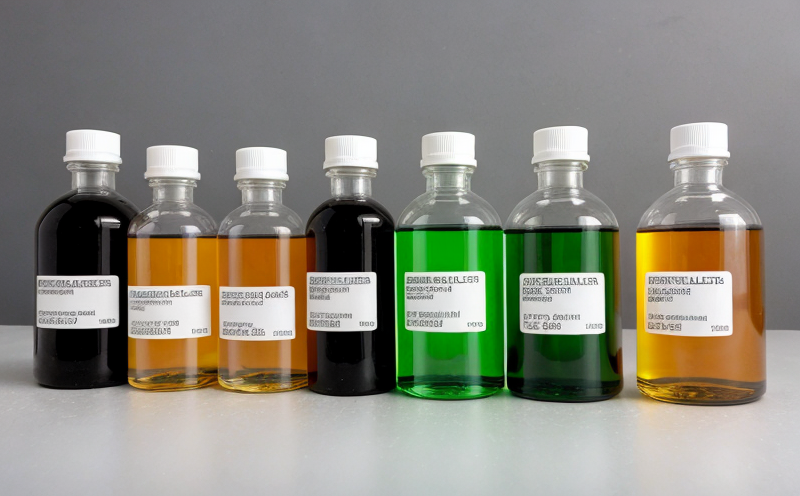Extractables Testing in Coated Medical Devices
The testing of extractables in coated medical devices is a critical step in ensuring patient safety and device efficacy. This process involves identifying and quantifying the materials that can leach into the body or surrounding environment from the coating material applied to the surface of medical devices during processing, sterilization, or use.
Coating is widely used in the medical device industry for various purposes, including enhancing biocompatibility, improving durability, and providing aesthetic appeal. However, coatings can also introduce potential risks due to the presence of residual solvents, monomers, or other chemicals that may migrate into contact with biological systems.
In a controlled environment, extractables testing helps manufacturers understand the materials that could potentially interact with patients during the device’s lifecycle. This knowledge is crucial for regulatory compliance and for minimizing post-market risks associated with adverse events. Extractables can be categorized based on their chemical properties or the source of introduction (e.g., residual solvents, monomers, cross-linking agents).
The testing procedure typically involves exposing the coated medical device to a series of simulated conditions that mimic real-world use and processing environments. These conditions may include exposure to water, saline solutions, or other specific media that could interact with the coating material.
After extraction, the sample is analyzed using various analytical techniques such as High-Performance Liquid Chromatography (HPLC), Gas Chromatography-Mass Spectrometry (GC-MS), Fourier Transform Infrared Spectroscopy (FTIR), and Nuclear Magnetic Resonance (NMR). The choice of analysis depends on the chemical complexity of the extractables and the regulatory requirements.
The results of these tests provide detailed information about the types and concentrations of materials that could be released into the patient’s environment. This data is essential for evaluating the safety profile of a medical device, especially when it comes to biocompatibility with tissues, fluids, or other bodily substances.
Regulatory bodies such as the U.S. FDA and the European Union (EU) require extensive documentation of extractables testing results in pre-market submissions. Compliance with these standards ensures that devices are safe for use and do not pose unacceptable risks to patients.
In addition to regulatory compliance, companies must also consider the broader implications of their test results. By understanding which chemicals could potentially leach out from coated medical devices, manufacturers can make informed decisions about material selection, processing techniques, and post-market monitoring strategies.
- Identifying Potential Risks: Extractables testing helps identify potential risks associated with the use of specific coating materials or processes.
- Improving Quality Control: By understanding which chemicals are present in extractables, companies can refine their manufacturing processes to minimize unwanted side effects.
- Enhancing Patient Safety: Comprehensive testing ensures that patients using coated medical devices do not come into contact with potentially harmful substances.
The importance of this service cannot be overstated. In the event of an adverse event, having detailed information about extractables allows manufacturers to conduct thorough investigations and implement corrective actions quickly.
To summarize, extractables testing in coated medical devices is a vital component of ensuring patient safety and regulatory compliance. Through rigorous analysis and reporting, this service helps companies make informed decisions that contribute to the overall success and longevity of their products.
Benefits
- Enhanced Patient Safety: By identifying and quantifying potential leachates, this service helps ensure that coated medical devices do not pose unacceptable risks to patients.
- Improved Quality Control: Understanding which chemicals are present in extractables allows manufacturers to refine their manufacturing processes to minimize unwanted side effects.
- Compliance with Regulations: Extractables testing ensures compliance with standards set by regulatory bodies such as the U.S. FDA and the European Union (EU).
- Informed Decision-Making: Comprehensive extractables testing provides detailed information that can guide material selection, processing techniques, and post-market monitoring strategies.
The benefits of this service extend beyond just meeting regulatory requirements; it also contributes to enhancing patient safety by ensuring that coated medical devices do not pose unacceptable risks. By understanding which chemicals could potentially leach out from these devices, manufacturers can make informed decisions about material selection, processing techniques, and post-market monitoring strategies.
Why Choose This Test
The decision to conduct extractables testing in coated medical devices is driven by the need for comprehensive understanding of potential risks associated with the use of specific coating materials or processes. By identifying and quantifying these substances, manufacturers can take proactive measures to mitigate any adverse effects on patients.
Additionally, this service plays a crucial role in ensuring regulatory compliance with standards such as those set by the U.S. FDA and the European Union (EU). Compliance is essential for gaining market access and maintaining trust among healthcare providers and consumers.
The expertise of our laboratory ensures that we provide accurate and reliable results, which are critical for informed decision-making throughout the product development process. Our comprehensive approach to extractables testing helps manufacturers make decisions that enhance both patient safety and regulatory compliance.
Quality and Reliability Assurance
Our laboratory is committed to delivering high-quality services with a focus on reliability and accuracy. We adhere to international standards such as ISO 17025, which ensures that our testing methods are robust and reproducible.
We use state-of-the-art equipment and highly skilled personnel to conduct extractables testing in coated medical devices. Our team of experts is dedicated to providing thorough and detailed reports that meet the needs of all stakeholders involved in the product development process.
Our commitment to quality extends beyond just meeting regulatory requirements; it also contributes to enhancing patient safety by ensuring that coated medical devices do not pose unacceptable risks. By understanding which chemicals could potentially leach out from these devices, manufacturers can make informed decisions about material selection, processing techniques, and post-market monitoring strategies.





